#Phyrgia
Video
youtube
Absolutely loved Elizaveta Kokoreva’s Phrygia debut! She is definitely one of my absolute favorite young dancers! This clip is just so moving and you can really see how much she has matured as a dancer recently.
8 notes
·
View notes
Text
Nice finds. I wonder if they were desacralised or if time simply took its toll.
5 notes
·
View notes
Text
Headcanon: Umbrella Academy
-The Umbrella Academy as Greek Gods (Klaus and Five)
Part 1
Klaus as Dionysus (Διώνυσος)

I know you’re going to say that this one is obvious and easy but hopefully, I will blow your mind because you are not ready for the depth of my analysis for this one. So we will start by getting the obvious out of the way. Dionysus is mainly known for being the god of wine and madness. This, of course, fits perfectly well with our drug-addicted-hissing-at-a-ghost Klaus. We will talk more about madness a bit later, so let’s focus on wine for a minute. Dionysus is associated with wine as a drink but as well as everything around it such as viticulture and the consumption of wine. In Ancient Greece there were two main events, where wine was important, that were considered dionysiac: symposium and komos. Symposiums take place after dinner and are reserved for men. It’s a moment to drink wine and talk about poetry, politics and love. It is reserved for an elite group of people that are part of the aristocracy and is held in private. This is very reminiscent of Klaus’ time in 1960. While he turned away from drugs and alcohol, he did end up being the leader of a cult, a very rich and elite cult. He was honoured in a way that is similar to Dionysus during symposiums. As for the komos, it is a celebration held after symposiums. After everyone is properly drunk, the party takes to the streets and people go around knocking on doors and inviting themselves into other parties. There’s an amazing example in Plato’s Symposium if you want to check it out! And this, this is exactly like Klaus in season 1. From the moment we meet him, we understand that, at this point in his life, he is someone who thrives when he is high. He will transgress any social norms without any second thought. He wants to be partying all the time. I also want to mention that Dionysus is associated with music and dance, but a kind of music and dancing that is liberating and not so much intellectual. You see, Dionysus plays a kind of flute named the aulos. Since it is a flute, it is impossible for him to play and talk at the same time, he cannot teach through his music. This combined with madness gives a more liberating aspect to his music. Now, we’ve seen Klaus dance, more than once. While all the Hargreeves seem to have fun dancing, Klaus is out there having the best time. The Footloose scene, he’s giggling like a little girl. The one when Hazel and Cha-cha end up kidnapping him, it is pure chaos. He truly doesn’t care about how he looks and clearly just wants to have fun. Dionysus is all about that kind of freedom and liberation, there’s a whole cult dedicated to Dionysus Eleutherios, literally meaning Dionysus the Liberator.
Before moving on to madness and mania, it’s worth mentioning some of Dionysus’s characteristics. Dionysus is all about ambiguity. He is man and woman, Greek and foreigner, God and mortal. And so is Klaus! Klaus is man and woman. In season 3 he basically comes out as non-binary but even before that, we get to see him embrace his more feminine side. I do think however that there is a difference here. Dionysus’s ambiguity regarding his gender is often questioned. It is part of the plot of many Ancient Greek plays. However, Klaus’s gender identity never seems to be questioned, not by his siblings or anyone else for that matter. So even if he, just like Dionysus, doesn’t care about the way he presents himself, others’ reactions do differ. Dionysus is also Greek and foreigner. He is a Greek god for sure, but in most stories, he is described as coming from another country, often Lydia or Phyrgia, and coming back to Greece to impose his cult on some cities like Thebes. Klaus also presents this characteristic. There is no denying that he is part of the Umbrella Academy. However, he is often forgotten by his siblings and seems like he doesn’t truly belong among their ranks. In season 1, he literally gets kidnapped by Hazel and Cha-Cha and no one notices it. In season 3, he goes on his own little adventure with dear old Reginald to learn about his immortality and once again, his siblings don’t really seem to notice his absence. So isn’t he like a foreigner in his own family? But at the same time, he is always there for them. He will pretend to be Five’s dad, he will make sure Allison and Viktor are having fun (and getting drunk), he cares about Ben a lot and they all do care about him in return. Diego will make sure he feels okay, Luther will protect him, Five will go see his mother with him and so on. At the same time, Klaus is part of and alienated from his family. Finally, Dionysus is, yes, a god, but often he is mistaken for a mortal. His mother, Semele, was a mortal woman, while his father is Zeus. So the fact that he could become a god is very unique. Many also thought that Semele had a child with a mortal and not a god. Similarly, Klaus is immortal. We know it for sure now, but there was a time when even he himself did not believe it. It is my opinion that when we meet him, in the ambulance, that is actually the first time we see his immortality at work. I’m convinced Klaus overdosed many many times but always thought paramedics were able to revive him instead of believing it could be his powers. But just like for Dionysus, there is an ambiguity. Did he always have these powers or did he just get lucky a lot? Ambiguity is at the heart of Klaus’s personality.
Now it’s time to talk about madness, or should I say mania. It is the right word to use when talking about Dionysus. The word ‘mania’ comes from the verb mainomai (μαινομαι) in Ancient Greek meaning to become crazy or furious. There are two types of mania as well, one is good, white mania, and deliberate, while the other, dark mania, is bad and imposed on someone. Usually, in myths and stories, dark mania is the one in cause. Both mania are the same in every other aspect. There’s no way really to differentiate them except for the willingness of the participants. Those afflicted by white mania are Dionysus’s followers, while he will inflict dark mania upon others. Right, so now we have enough info to move on to Klaus. Because, just like Dionysus, Klaus does gain a large following of people. Obviously, in season 2, he has a whole cult following him almost blindly and you can see how they are similar to Dionysus followers. They willingly decided to follow Klaus, just like people afflicted with white mania willingly follow Dionysus. They are very loyal to him and will do basically anything he asks even if it is dangerous. But, he doesn’t really abuse his power to make them suffer, as he does not feel the need to. Similarly, Dionysus won’t mess with those afflicted by white mania, since they already follow him willingly. However, more importantly, Klaus has one really unwilling follower, Ben! He does not want to be around Klaus yet is stuck with him. Or at least that is what we think is happening for most of the show. We are made to believe that Klaus’s need for Ben was what made him come back as a ghost. That Klaus was the one to make him stay around because of his emotions and powers. This is very similar to dark mania. Dionysus’s want for trouble and respect is what pushes him to use his power and inflict dark mania. Even in the end, once we learn the real reason why Ben stayed, we could argue that Ben did it because of Klaus. Not because Klaus was forcing him to stay, but because he was allowing him to do so. Klaus was allowing him to take his time and ‘cross to the light’ when he is ready. His mania ended once its purpose was fulfilled, which is very alike dark mania in myths. Dark mania doesn’t last forever. Once Dionysus is content, it goes away and people are faced with the horrors they did while afflicted by mania (like dismembering their own son). So, Klaus’s relationship with Ben can be seen as similar to one of dark mania but with a much nicer ending.
Lastly, Dionysus is also the god of theatre, and boy oh boy is Klaus a drama queen! For this aspect of Dionysus, I would like to talk about one play in particular, The Frogs (βάτραχοι) by Aristophanes. Why this play? Because it’s my favourite! But seriously, because I really do think that Dionysus in this comedy is a lot like Klaus. Fun fact, comedy in Ancient Greek might have came from ritual chants that took place during komos, which I talked about earlier. We don’t know as much about comedy as we do about tragedy, but this is still one of the possible origins. Moving on to the play, it is roughly divided into two parts. In the beginning, we meet Dionysus, who wants to go to the underworld to bring back Euripides, a real-life tragedian who died the year prior. He comes up on stage disguised as Herakles, as he is one of the few who came back from the underworld. These first scenes really are a mix of slapstick humour and misunderstandings. It is very crude humour but there are still some very witty comebacks. This is a lot like Klaus when we first meet him. He is this very absurd and comedic character who once waxed his butt with chocolate pudding and hisses at a ghost. Though we still have to acknowledge that there is a kind of cleverness to him. He did manage to steal from his father for a long time without getting caught. Even in the extreme, he still keeps a certain control over the chaos. Like when he pretended to be Five’s father in season 1. He played a role, a character, which is in itself related to Dionysus. But more than that, he created a really chaotic and unbelievable story but still managed to come up on top… kind of… The whole scene uses the very same kind of humour as the beginning of The Frogs. The play goes on and Dionysus reaches the underworld. Once he’s there, he realizes that Euripides is having a fight with Eschyles, another real-life tragedian that died. Suddenly, the whole play takes a turn and Dionysus improvises himself as judge of their conflict. The two playwrights go on to have a very intellectual fight where they try to prove how their own tragedies were better for the Athenians. This is a complete shift in the type of humour. Suddenly, it is required to have a good understanding of not only theatre but also plays, authors and tragedy to be able to understand The Frogs on all levels. We can see a similar shift in Klaus. Once he loses Dave, he changes. He’s not this always-happy-and-nothing-is-ever-bothering-me kind of person anymore. But he still is, in a way, the comedic relief. He still is one of the characters you look to when you need to laugh, but it’s much more subtle now. As the show goes on, Klaus does achieve a kind of balance between this more absurd and physically comical character and a more intellectual and sarcastic one. Similarly, this play, which is about Dionysus and his characterization by Aristophanes, does require some balance to work and make any Athenian citizen laugh and have a good time.
Five as Prometheus (Προμηθεύς)

For this one, I have to start by explaining the name itself. Prometheus or Προμηθεύς in Ancient Greek comes from the prefix pros (προς) meaning ‘before’ and the word metis (μῆτις) which is a more complicated word. You see metis generally means ‘skill’ or ‘intelligence’, it is the name of the goddess associated with wisdom, skill and craft. However, this word is specific to a more cunning intelligence, one where you trick people. You can think here of Odysseus. He is the perfect example of someone who uses his metis, especially when tricking the Cyclops (and I could talk about this for days!!). So, Prometheus’ name literally means ‘the one who uses his intelligence before’, ‘the one who thinks before’. He has forethought. And this is exactly like Five! How many times have we seen him make plans and calculations to figure out what will happen next? Yes, he’s been to the future and in some situations knows what will happen next, but it doesn’t stop him from thinking about every possible outcome and being ready for every single one of them. He is a lot like Prometheus and it will be even more flagrant when retracing what Prometheus did in the myths.
The first mythological episode I want to talk about is actually one that is very important, the trick at Mekone. Why is it important? Because it basically explains why sacrifices in Ancient Greece were the way they were. It’s what we call an etiological myth, stemming from the word aitia (αιτια) meaning cause in Ancient Greek. But let’s get on with it! The story starts with the gods having a meeting with the mortals at Mekone where the division of a sacrifice between them is to be decided. The ox, killed, is divided into two piles, one with the meat and one with the bones. Prometheus, to trick Zeus into choosing the bad pile, puts nice fat on top of the bones and the ox’s stomach on top of the meat. Zeus goes on to choose the bad pile, while the humans get the one with the meat. Did Zeus know he was choosing the bad pile? According to Hesiod, yes. But that doesn’t really matter to us. What matters is that Prometheus just decided to help the humans and just showed that he doesn’t like Zeus very much. Well, this sounds a lot like Five. On one hand, Five is just constantly helping humanity. He is willing to try and stop the apocalypse over and over again if it means saving the world. On the other hand, he also is, in a certain way, in competition with Reginald, the Zeus of the Umbrella Academy. The thing with Prometheus though is that his competition with Zeus is solely based on intelligence and ruse. He will try to outsmart Zeus in any way he can. And this, this is exactly like Five. Right off the bat, he tried to prove to Reginald he knew better than him when he decided to try time travel. He had to prove him wrong by being more clever. This goes on throughout the whole show. Five constantly need to prove to everyone that he is more clever than them but especially Reginald. He didn’t have to go around and quote the beginning of the Odyssey in the original Greek but he did it anyway!
The second mythological episode is the one where Prometheus steals the fire from the gods to give it to the humans. After the trick at Mekone, Zeus, still mad at Prometheus, decided to hide the fire from the mortals. Prometheus then stole it and gave it back to the mortals while also teaching them the arts of Hephaistos and Athena. Zeus admits that Prometheus outsmarted him before taking his revenge by sending Pandora to the mortals and sentencing Prometheus. If this isn’t exactly Five then I don’t know what it is. Five disobeyed Reginald, keeps finding a way to get what he wants from him, goes behind his back, seeks out his enemies and old friends with only one thing in mind, saving the world from the apocalypse. But there’s more to it. When Five learns valuable information from either Reginald, Pogo or his own older self, he doesn’t just keep it to himself. He tells his siblings so they can use it to better themselves or change their view of the situation. He’s not always good at it and can be really harsh but you can tell he truly wants what’s best for them Similarly, Prometheus did not only give the fire back to humans, he taught them how to use it to make their lives easier.
Finally, for all his crimes against the gods, Prometheus was sentenced to eternal torture. An eagle is to eat his ever-regenerating liver for the rest of time. However, generations and generations after first being sentenced, Prometheus will be set free by Herakles (that is Hercules’ name in Ancient Greek). Similarly, Five is in a way sentenced to save the world from the apocalypse over and over again. Ok, it might have only happened three times, but saving the world is a whole lot to do. Especially more than once! Eternal torture is also extremely lonely and Five did experience a similar kind of loneliness and pain when he got stuck in the future. I’d also add that Herakles is a son of Zeus. So far, we’ve talked about how Reginald is similar to Zeus. Logically then, one of Reginald’s children would be the one to save Five from his eternal torture which is what happens in the show in my opinion. Five’s siblings, Reginald’s children, decide to help him save the world from the apocalypse, to stop him from having to endure this torture alone. In a way, they save him just like Herakles did.
#mindful-of-ideas#umbrella academy#umbrella academy headcanon#klaus hargreeves headcanon#five hargreeves headcanon#klaus hargreeves#five hargreeves#number five#greek gods#greek mythology
38 notes
·
View notes
Text
wrote sum stuff for a scott pilgrim oc of mine
said writing continued under the cut, check tags for tws
i am snapped awake by a jolt of electricity, exploding through my veins and putting a jumpstart to my heart. it felt like a kick from a mule whenever my heart started pounding, like an old train engine suddenly forced to carry freight after not being in use for so long.
it was cold. i was cold. my eyes flew open as i sat up like i had been pulled by some otherworldly force. i looked around. it was dark. two men in glasses cheered, round and square framed.
"HES ALIVE!" the one in the circular frames cried, his clothes and glasses covered in blood. thats when i became aware of my own body, completely bare against the cold stainless steel metal operating table.
i only saw more blood, and fresh stitches on my abdomen where i had been operated on. my brain flickered to life, though nothing about myself i knew. it was confusing. i was dazed, momentarily.
i realized i had tubes attached to me, in my arms and on the back of my neck. thats when the adrenaline rush hit, and it hit hard. the men were still cheering as i ripped the tubes from my body, getting up off of the table, stumbling as i struggled to walk.
the man in the circular glasses didnt notice me get up, so i ran. however, the one with the sharp rectangular ones noticed and tried to subdue me.
i felt my arm move back, then barrel towards the mans face like a bullet. it hit him smack on the nose, with a small crack. the punch i threw was almost like muscle memory. memory that my brain didnt have.
i think i broke his nose, but i definitely broke his glasses. he fell to the ground, in agony. he called for the man in the circular frames.
midas.
that name i wont forget. thats because i knew what that name was from. greek mythology. the king of phyrgia, who could turn anything to gold, haven been blessed by dionysus.
thats when i put two and two together, as i ran up the stairs, my bare feet smacking against cold concrete. i had just been brought back from the cold clutches of death.
ironic his name was midas, then. he brought me back to life. no touch of gold, a touch of life. though i could sense judging by the cold dark basement i had to run up from, the intentions of this were.. dubious at best. i dont want to think about the worst.
when i reached the top step, there was a ladder i had to climb to reach a trap door. mustve been correct in my judgement this place had less than humane intentions, as it was locked up tight. i began to scale the ladder as i heard footsteps pattering from the stairwell below. just as i heard the mans voice, i was up and out of the trapdoor.
i was now in an office of some sort, where i noticed a trash chute. in that split second, i decided to jump in, knowing it was either escape into the trash or be caught and used for god knows what from these men.
i opened the trash chute, sliding inside. i was barreling down, my bare skin freezing against the cold metal. then, just as i got the feeling my body would never stop hurtling downward, i hit the bottom of the trashcan with a loud metallic pang.
i mustve been unlucky, it mustve been trash day recently. my entire body ached. from the sudden jolt to life, the stitches my body had, and from hitting the empty garbage bin. i had to lay there for a second, breathing heavily.
soon, i crawled out of the garbage. i knew theyd be looking for me. i was in a dark alleyway. it smelled awful, i mustve been wrong about trash day, because the other bins themselves were full. did they switch them out? oh well, it didnt matter. i stumbled out, searching for something to cover up.
i managed to find some clothes, though dirty, ruined, and too small on me, which smelled of garbage. but it was better than nothing. i had to get the hang of walking, even though my newly awakened muscles begged me not to. i felt like i was about to collapse.
i saw a building in the distance, cars all around it. there was flashing multicolored lights coming from the windows, and i could feel the baseline from here. a party. perfect. i needed help, before i passed out in the alleyway and woke up in that mysterious laboratory again.
i shuffled my way towards the building, making a beeline for the doors. i felt like a zombie. i definitely looked like a zombie too. i passed by a graveyard on the way. i thought it was ironic, though, i could barely form thoughts that were coherent that werrent about the current situation at hand.
i pushed my way through the doors when i got there, hobbling to my destination, though i didnt exactly have one. i received weird looks from the people at the party as i shuffled along aimlessly, in no particular direction.
i bumped into two people, men, who looked scarily alike each other. i ignored it, and kept walking. i also bumped into a man wearing all black, but i ignored him too. i pushed through a crowd, bumping into various people.
there was a woman wearing round glasses, like midas, with her hair up in a ponytail. she snapped at me to watch where i was going, but i ignored her. i bumped into another person, a man with scruffy brown hair and close shaven beard. he looked slightly nervous, but i didnt pay attention to it.
i pushed through, bumping into several people along the way. an unkempt man in a beanie, a girl with shoulder length, straight black hair, a clearly drunk man in a sweater and messy black hair, holding a martini.. i also slightly remember a guy with long brown hair and a sort of creepy smile i didnt like. but none of that mattered when i broke through the other end of the crowd.
i made my way to a table, with various things to eat on it. thats where i saw him. a guy, about my age, holding a plastic cup with punch inside of it. he looked just as confused as i am, with his light brown hair swept over his head. he wasnt wearing anything remarkable, just a tshirt and jeans. but this was the guy i decided i was going to ask for help from.
i opened my mouth to speak, but i just held my mouth open. he looked confused. i tried again, only to realize that my voice was gone. i was worried. had i just lost my voice, or had they taken my vocal chords out entirely? i tried once more. i managed to mumble the word "help," albeit pretty quiet for the scenario.
unfortunately, that was all i could attempt to say. i felt my eyes getting heavy, knees week, vision blurring. my hearing became dampened as i felt myself hit the floor with a soft thud. the last thing i remember was seeing the footsteps of people walking towards me and the anxious chatter from the crowd, before my eyes fully shut and i became unconscious.
#scott pilgrim vs the world#scott pilgrim takes off#scott pilgrim#scott pilgrim gideon#scott pilgram takes off#scott pilgrim anime#scott pilgrim oc#scott pilgram#oc#spto oc#writing#oc writing#tw blood mention#tw alchohol mention#cw
7 notes
·
View notes
Text
Character Intro: Aura (Kingdom of Ichor)






Nicknames- Swifty by Lantos
Age- 18 (immortal)
Location- Phyrgia, Olympius
Personality- Much like her father, she's stubborn and stoic with a quick wit & an even quicker tongue, never afraid to speak what's on her mind. Aura is very vocal about the discrimination and injustices she feels that generally falls on the minor deities. She's single.
Being the goddess of the breeze (as it pertains to the cool air of the early morning), her abilities include limited aerokinesis (shifting wind currents to keep her scent undetectable/stilling the air so she can hear better when hunting), enhanced speed (though not to the extent of Hermes) & being a skilled hunter and archer (not to the level of her cousins).
She lives with her parents in Phyrgia. Aura has a good relationship with them and she doesn't mind the near quiet atmosphere of her surroundings. She helps her mom with their farm, tending to the animals & working alongside her in the garden. She often goes out training and hunting with her father.
Aura usually starts the day early, nearing dawn. She jogs, works out, does ballet & yoga as a start off.
Her go-to drink is a pineapple guava white tea. Her mother makes it for her. Aura also likes iced tea, ginger ale, cola, and blueberry juice. She also likes the medium vanilla frappucino from The Roasted Bean.
A favorite thing of hers to snack on is bison jerky.
A favorite sweet treat for her is s’mores ice cream cake! Her & her mom will get it every other week at the supermarket.
Aside from the summers she would spend in Delos as a child, Aura has never really left Phyrgia, not even to go underwater to the freshwater territories to visit her maternal grandparents Oceanus (Titan god of the sea) and Tethys (Titaness of freshwater & clouds). Her grandparents have instead come by to visit her. Aura does have a good relationship with her many aunts and uncles (nearly 3,000 of them!) & cousins on her mother's side.
She doesn't have a close relationship with her father's side of the family, except with her aunt Leto (Titaness of demurity & motherhood). Aside from seeing photos of them at her aunt's & looking them up online, Aura hasn't met her other grandparents Coeus (Titan god of foresight, intellect, & knowledge) and Phoebe (Titaness of prophecy, the moon, radiant intellect, & mystery). Aura despises her cousins Apollo (god of the sun, music, poetry, healing, medicine, archery, plague, light, & knowledge) and Artemis (goddess of the hunt & moon). With the three of them, the spirits of competition, envy, and jealousy would overtake them. They would constantly compete against each other, 2-to-1. They would also pull pranks. After an especially mean spirited prank was pulled on Aura by Artemis, Aura decided to never come back to Delos.
She doesn't have a high opinion about the rest of the pantheon in general, especially towards her "oh-so perfect" cousins' father- the King. Aura does happen to follow Pasithea (goddess of hallucinations & relaxation), Nike (goddess of victory), Astraeus (Titan god of dusk), Hestia (goddess of the hearth), Eos (Titaness of dawn), & Boreas (god of the north wind) on Fatestagram. She does admire Ichnaea (goddess of tracking).
Online, Aura also runs her own blog which is dedicated to the plights of minor deities. She does respect the MGM movement, but feels that Pasithea lacks the "fire" intended to push forward the movement in a big way.
She has been exchanging flirty messages on Fatestagram with a fellow hunter, Actaeon. Nothing further has happened. No numbers exchanged or talks about meeting in person.
Aura is a personal fan of Momentum, the goddess Nike's sneaker brand.
She doesn't cook. Aura likes her Aunt Leto's rice & gravy, her dad's venison steak (with a nice helping of tzatziki sauce), her mom's potato salad, and her Nana Tethys' fried frog legs.
In her free time, Aura enjoys hunting, archery, reading, cliff diving, basketball, kayaking, swimming, skateboarding, rplaying video games, ollerblading, ballet & doing yoga.
"With a whisper of the wind, you won't even know when I'll have you in my trap."
#my oc#my oc character#my character#oc character#oc intro#character intro#oc introduction#character introduction#modern greek gods#modern greek mythology#greek myth retellings#greek goddess#greek goddesses#greek mythology#greek pantheon
6 notes
·
View notes
Text
Turkish Stele Found, Mentions Famous King Midas
The stele has hieroglyphs boasting off the conquest of Phyrgia and its king. Phyrgia, an Iron Age kingdom in the 700s BCE in Anatolia, was ruled by a couple of King Midases. But the dating of this particular stele suggests it commemorates the most famous King Midas.
The stone markings also contained a special hieroglyphic symbolizing that the victory commemoration was created by a different king, a man called Hartapu. The hieroglyphs suggest Midas was captured by Hartapu's forces. This makes the stele doubly significant as nothing was previously known about this King Hartapu or the kingdom he ruled. The newly-found stele suggests the giant mound of Türkmen-Karahöyük that the archaeologists were excavating may have been Hartapu's capital city. And it was a big city, sprawling over 300 acres in its heyday.
195 notes
·
View notes
Text
“...Kybele was a woman who wandered the earth teaching rites of purification and attracting an enthusiastic following through the inspiration of her music. These are exactly the attributes of Kybele as depicted by Euripides in his Bacchae. There Kybele is also called Rhea, and the story of her mortal origin and subsequent deification is left out of the account. (Euripides focuses the theme of ambiguous divinity on Dionysus.) But the idea of gods who had once been mortals was certainly known to Euripides and his contemporaries. Prodicus of Ceos advanced an account of Demeter and Dionysus as mortals who taught agriculture and viticulture, and who were accorded divine honors after their deaths in recognition of their gifts to humanity. The argument that the gods familiar to the Greeks were once mortals was a key element in the suspicion that sophists like Prodicus were atheists. [And remember that the original meaning of atheos, “atheist,” was “godless” rather than “denier of gods.”] The cosmogonic ideas of Prodicus are ridiculed by Aristophanes in his Birds, the very play in which Aristophanes also ridicules superstitious Phrygians and Lydians, but also honors the divinity of “Mistress Kybele, . . . mother of gods and men” (perhaps with comic irony). Diagoras of Melos, who is also made fun of in the Birds and who was remembered centuries later as “the Atheist,” offended against the Mysteries of Demeter at this time through his writings in a book known by the title Phrygian Stories (Fruvgioi Lovgoi). It is highly likely that the sophistic tradition, which included treatises on Phrygian lore, took up the question of the identification of the Mother of the Gods with the mother of Midas.”
- Mark Munn, The Mother of the Gods, Athens, and the Tyranny of Asia: A Study of Sovereignty in Ancient Religion. University of California Press, 2006. p. 81-82.
#kybele#demeter#dionysus#euripides#aristophanes#prodicus of ceos#diagoras of melos#atheism#atheist#phyrgia#lydia#mother of the gods#divine mortals#midas#syncretism#asiatic origin#greek religion#ancient religion
6 notes
·
View notes
Photo
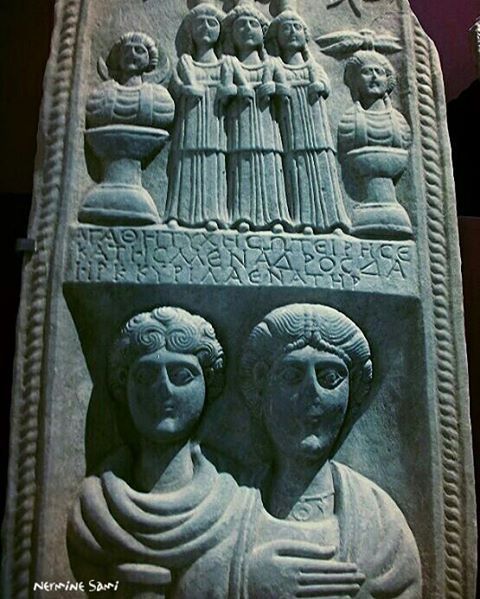
Funerary stele of Glykon and his son Tateis,from the region Phrygie, Stèle funéraire de Glykon et de son fils Tateis Région : Phrygie@MuseeLapidaire,Avignon-France...to read more: http://www.musee-lapidaire.org/oeuvres-antiques/fr/oeuvre/stele-funeraire-de-glykon-et-de-son-fils-tateis #avignon ,#greek ,#funerarystele ,#muséelapidaire ,#relief ,#suddefrance ,#france🇫🇷 ,#greekart ,#phyrgie ,#phyrgia,#frenchmuseums ,#museo ,#musée ,#greque ,#archaeology (at Avignon, France)
#funerarystele#archaeology#suddefrance#greek#greque#phyrgie#greekart#musée#avignon#phyrgia#frenchmuseums#museo#relief#muséelapidaire#france🇫🇷
2 notes
·
View notes
Photo









Elizaveta Tuktamysheva, Spartacus: Adagio of Spartacus and Phyrgia by Aram Khachaturian
2020-2021 Short Program
Choreography by Anna Cappellini and Luca Lanotte
Costume by Gala Filatova
#elizaveta tuktamysheva#figure skating#fs#anna cappellini#luca lanotte#figure skating dresses#figure skating costumes#this will probably become a series#season: 2020 2021#gala filatova
74 notes
·
View notes
Text
Gather around, children, it is time for me to tell you a story.
About what?
Well…
It is a cautionary tale, about a man who chose materialism over wisdom and patience, greed over modesty, who became so overcome by his desire for grandiosity that it led him to his death.
Oh, I’ll like this one.
Yes, I know you will.
So please start telling the story! Tell it, tell it!
Okay, okay.
Hundreds of years ago, in a city that is located today in Turkey, known as Phyrgia, there was a king.
His name was King Midas.
#part one#hbsmp remulus#hellbox#hellbox smp#king remulus#hbsmp!remulus#hellbox king remulus#hbsmp#hbsmp king remulus
3 notes
·
View notes
Text
Philemon
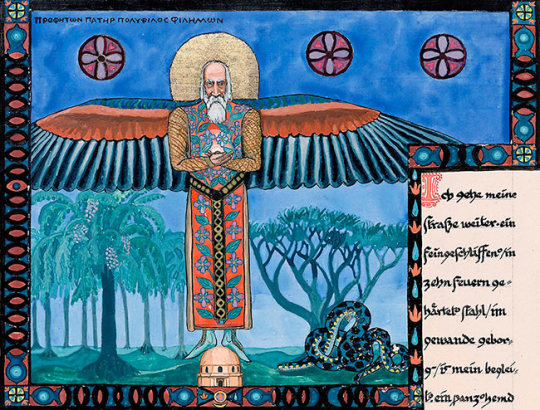
Who is Philemon?
Philemon is a figure who appears in two literary works:
Ovid's "Metamorphoses", and Goethe's "Faust".
In "Metamorphoses", Ovid narrates how Jupiter and Mercury wandered around, disguised as mortals in the hill country of Phyrgia.

Searching for a place to rest, they were turned away from a thousand homes until they were met by an elderly couple- Philemon and Baucis, who graciously invited these strangers into their humble cottage.
Philemon and Baucis had married in their youth in their cottage and have grown old together in it, accepting their poverty. To honor their guests they offered to kill their only goose. The goose took refuge with the gods who decreed that it should not be killed, and revealed themselves to the couple, saying that those around them would be punished but they would be spared.

With the Gods, they climbed into safety atop a mountain, and upon reaching the top, they saw that the entire country was flooded. Only their cottage remained, now transformed into a temple made of columns of marble and a roof of gold.
To repay their kindness, the gods granted the old couple any wish, to which Philemon and Baucis' reply was in keeping with their deep humility and reverence.
They wished to become priests and serve in this new shrine to the gods and to die at the same time as a testimony of their enduring love. And so it happened, and when they died, the gods honored them further by tranforming them into trees so that they could continue to live side by side in this way as they had in their mortal lives.
Much later, Goethe uses the old couple as a literary allusion in his book, "Faust".

In Faust, Goethe has Faust build a city on land reclaimed from the sea. In order to do this, Faust tells Mephistopheles (The Devil) that he wants the old couple, Philemon and Baucis, who live there, to move.
To Faust's ultimate horror, Mephistopheles burns the old couple's cottage, with the two still alive inside.
In 1913, during a period of psychosis, Carl Jung recounts a dream in his book, "Memories, Dreams, Reflections" in which a figure named Philemon appears to him.
Jung saw a sea-blue sky covered by brown clods of earth that appeared to be breaking apart. Out of the blue, he saw an old man with kingfisher wings and the horns of a bull flying across the sky, carrying a bunch of keys.

After the dream, Jung painted the image, because he did not understand it. During this intense period, Jung was struck by the synchronicity of finding a dead kingfisher, a bird rarely seen around Zürich, in his garden by the lakeshore.
Thereafter, Philemon played an important role in Jung’s fantasies. To Jung, he represented superior insight and functioned like a guru to him.
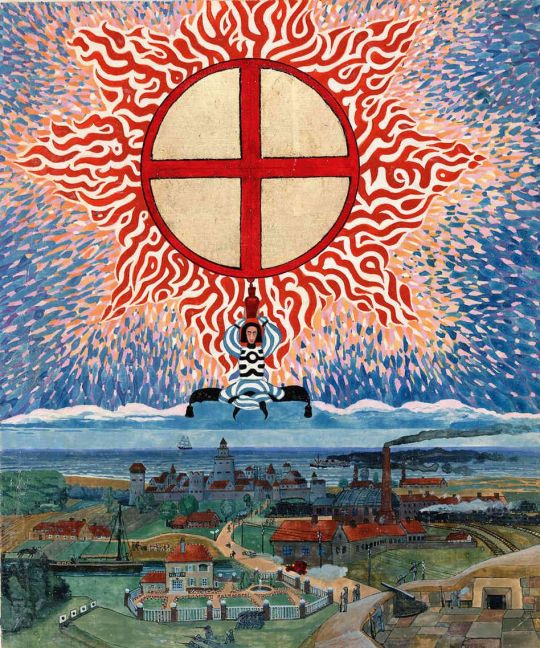
Philemon explained how Jung treated thoughts as though they were generated by himself, while for Philemon "thoughts were like animals in the forest, or people in a room, or birds in the air."
Jung concluded that Philemon taught him "psychic objectivity, the reality of the psyche."
This helped Jung to understand that there is something in us which can say things that we do not know and do not intend.
Goethe's Faust also made a tremendous impression on Jung and held a life-long significance for him.

He felt personally implicated by the destruction of these humble and reverent figures and felt that it was his responsibility to atone for this crime and to prevent its repetition in the 20th century.
Healing this "Faustian split"- the breaking off of man's spiritual, intuitive, and psychological understanding for the western world's rapid emphasis on industrialization and hyper-rationality would become a central theme in Jung’s life work.

At his tower in Bollingen, Jung commemorated Philemon. Over the gate, he carved the inscription,
“Philemonis Sacrum – Fausti Poenitentia”
[Philemon’s Shrine – Faust’s Repentance].
In one of the rooms at Bollingen, he painted a huge mural of the winged Philemon, essentially reproducing the painting from the Red Book.
In a letter to Paul Schmitt in 1942, Jung wrote:
“I have taken over Faust as my heritage, and moreover as the advocate and avenger of Philemon and Baucis, who, unlike Faust the superman, are the hosts of the gods in a ruthless and godforsaken age.”
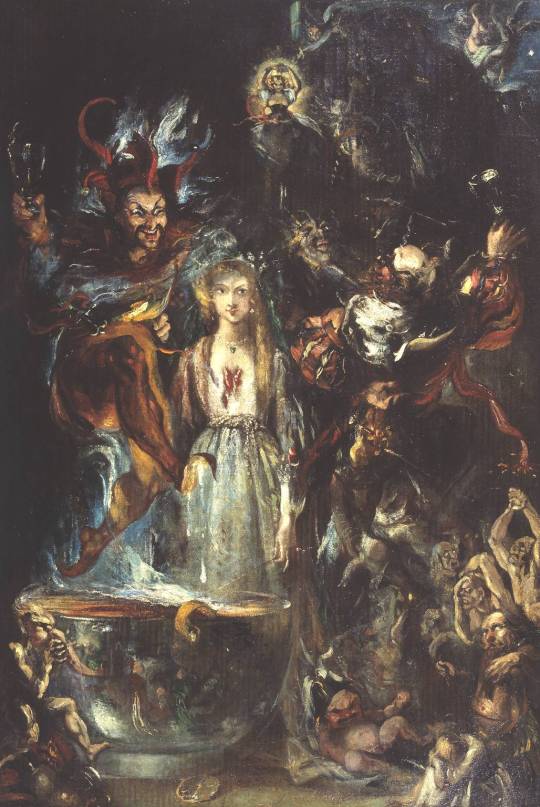
What does this all mean, and why is Philemon important?
To quote W.H. Auden:
"We are lived by powers we do not understand."
Often, rather than us having ideas, it is ideas that instead have us.
The "Faustian split" which Jung warns us about, and vigilantly fought against his whole life is the tendency for mankind's rationality to fall in love with itself and it's own creations.
When we end up prioritizing specific ideologies or systems of understanding over the dignity of the individual, we risk being inauthentic, and inevitably neglect or even deny what cannot be justified by our own ideologies.
This is analogous to what happens in any tyrannical society, any dogmatic religious system, or oppresive political party/point of view.
If you need any examples of this. You need only to look around, or turn to history and you will see it everywhere you go.
You will see it in racism, sexual orientation/class prejudice, gender inequality, the holocaust, and the gulag.
If we are not careful, there is an unconscious part within each and every person that is capable of commiting horrifying actions under the justification and rationalization of any ideology.
In this sense, Philemon acts as a counter-symbol: a spiritual totem that represents the individual's consciousness/psychological awareness behind rationality.
The symbol of Philemon suggests that there are things that cannot always be grasped by rationality and logic but can be peripherally known through other means using our own individual intuition and discernment.
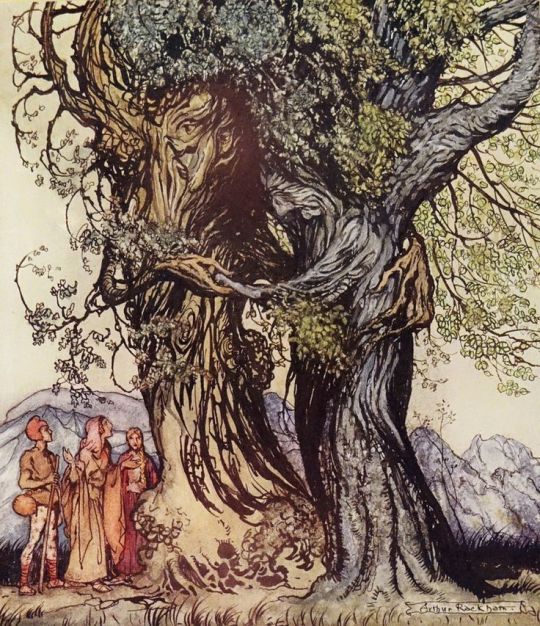
#psychology#jung#spirituality#carl jung#philosophy#philemon#alchemy#literature#story#transcendental#meditation#archetypes#myth#dream#reflection#journal#introspection#art#spirit#creative#text#written
27 notes
·
View notes
Text


Χαίρε νύμφε! Χαίρε Βᾰ́κχε! Eὐοῖ Eὐοῖ Eὐοῖ!
Bakkhos I call, loud-sounding and divine, fanatic God, a two-fold shape is thine:
Thy various names and attributes I sing, O, first-born, thrice begotten, Bacchic king:
Rural, ineffable, two-form'd, obscure, two-horn'd, with ivy crown'd, euion, pure.
Bull-fac'd, and martial, bearer of the vine, Euboleus and divine:
Triennial, whom the leaves of vines adorn, of the God and Persephone, occultly born.
Immortal dæmon, hear my suppliant voice, give me in blameless plenty to rejoice;
And listen gracious to my mystic pray'r, surrounded with thy choir of nurses fair.
Come, blessed Dionysos, various nam'd, bull-fac'd,
begot from Thunder, Bakkhos fam'd.
Bassarian God, of universal might, whom swords, and blood, and sacred rage delight:
In heav'n rejoicing, mad, loud-sounding God, furious inspirer, bearer of the rod:
By Gods rever'd, who dwell'st with human kind, propitious come, with much-rejoicing mind.
Liknitos Dionysos, bearer of the vine, thee I invoke to bless these rites divine:
Florid and gay, of nymphs the blossom bright, and of fair Aphrodite, Goddess of delight,
'Tis thine mad footsteps with mad nymphs to beat, dancing thro' groves with lightly leaping feet:
From Zeus' high counsels nurst by Persephone,
and born the dread of all the pow'rs divine:
Come, blessed pow'r, regard thy suppliant's voice, propitious come, and in these rites rejoice.
Dionysos Perikionios, hear my pray'r,
who mad'st the house of Cadmus once thy care,
With matchless force, his pillars twining round, (when burning thunders shook the solid ground,
In flaming, founding torrents borne along), propt by thy grasp indissolubly strong.
Come mighty Bakkhos to these rites inclin'd, and bless thy suppliants with rejoicing mind.
Hear me, illustrious father, dæmon fam'd.
Great Kronos' offspring, and Zabazios nam'd;
Inserting Bakkhos bearer of the vine, and founding God, within thy thigh divine,
That when mature, the Dionysian God might burst the bands of his conceal'd abode,
And come to sacred Tmolus, his delight, where Ippa dwells, all beautiful and bright.
Come blessed Phrygian God, the king of all, and aid thy mystics, when on thee they call.
Great nurse of Bakkhos, to my pray'r incline, for holy Sabus' secret rites are thine,
The mystic rites of Bakkhos' nightly choirs, compos'd of sacred, loud-resounding fires:
Hear me, terrestrial mother, mighty queen, whether on Phyrgia's holy mountain seen,
Or if to dwell in Tmolus thee delights, with holy aspect come, and bless these rites.
Hear me, son of the God, blest Bakkhos, God of wine, born of two mothers, honor'd and divine;
Lysian, Euion Bakkhos, various-nam'd, of Gods the offspring secret, holy, fam'd:
Fertile and nourishing whose liberal care earth's fruits increases, flourishing and fair;
Sounding, magnanimous, Lenæan pow'r, O various form'd, medic'nal, holy flow'r:
Mortals in thee, repose from labour find, delightful charm, desir'd by all mankind:
Fair-hair'd Euion, Bromian, joyful God, Lysian, invested with the leafy rod.
To these our rites, benignant pow'r incline, when fav'ring men, or when on Gods you shine;
Be present to thy mystic's suppliant pray'r, rejoicing come, and fruits abundant bear.
Nymphs, who from Okeanos' stream derive your birth, who dwell in liquid caverns of the earth
Nurses of Bakkhos' secret-coursing pow'r, who fruits sustain, and nourish ev'ry flow'r:
Earthly, rejoicing, who in meadows dwell, and caves and dens, whose depths extend to hell:
Holy, oblique, who swiftly soar thro' air, fountains and dews, and mazy streams your care:
Seen and unseen, who joy with wand'rings wide and gentle course, thro' flow'ry vales to glide;
With Pan exulting on the mountains height, loud-founding, mad, whom rocks and woods delight:
Nymphs od'rous, rob'd in white, whose streams exhale the breeze refreshing, and the balmy gale;
With goats and pastures pleas'd, and beasts of prey, nurses of fruits, unconscious of decay:
In cold rejoicing, and to cattle kind, sportive thro' ocean wand'ring unconfin'd:
Nysian, fanatic Nymphs, whom oaks delight, lovers of Spring, Pæonian virgins bright.
With Bakkhos, and with the Lady, hear my pray'r. And to mankind abundant favour bear;
Propitious listen to your suppliants voice, come, and benignant in these rites rejoice;
Give plenteous Seasons, and sufficient wealth, and pour; in lasting streams, continued Health.
Bakkhos fanatic, much-nam'd, blest, divine, bull-fac'd Lenaian, bearer of the vine;
From fire descended, raging, Nysian king, from whom initial ceremonies spring:
Liknitan Bakkhos, pure and fiery bright, Eubouleos, crown-bearer, wandering in the night;
Pupil of Persephone, mysterious pow'r, triple, ineffable, Zeus' secret flow'r:
Ericapæus, first-begotten nam'd, of Gods the father, and the offspring fam'd:
Bearing a sceptre, leader of the choir, whose dancing feet, fanatic Furies fire,
When the triennial band thou dost inspire.
Loud-sounding, Tages, of a fiery light, born of two mothers
Wand'ring on mountains, cloth'd with skins of deer, Apollon golden-ray'd, whom all revere.
God of the grape with leaves of ivy crown'd, Bassarian, lovely, virgin-like, renown'd
Come blessed pow'r, regard thy mystics voice, propitious come, and in these rites rejoice.
Dionysos Khthonios hear my pray'r, awak'ned rise with nymphs of lovely hair:
Great Amphietus Bakkhos, annual God, who laid asleep in Persephone's abode,
Did'st lull to drowsy and oblivious rest, the rites triennial, and the sacred feast;
Which rous'd again by thee, in graceful ring, thy nurses round thee mystic anthems sing;
When briskly dancing with rejoicing pow'rs, thou mov'st in concert with the circling hours.
Come, blessed, fruitful, horned, and divine, and on these rites with joyful aspect shine;
Accept the general incense and the pray'r, and make prolific holy fruits thy care.
Great nurse of Bakkhos to my pray'r incline, Silenos, honor'd by the pow'rs divine
And by mankind at the triennial feast illustrious dæmon, reverenc'd as the best:
Holy, august, the source of lawful rites, rejoicing pow'r, whom vigilance delights
With Sylvans dancing ever young and fair,
head of the Bacchic Nymphs [Naiades and Bakkhai], who ivy bear.
With all thy Satyrs on our incense shine, Dæmons wild form'd, and bless the rites divine;
Come, rouse to sacred Joy thy pupil kin, and Brumal Nymphs with rites Lenaian bring;
Our orgies shining thro' the night inspire, and bless triumphant pow'r the sacred choir.
-----
Καλά Ανθεστήρια! Happy Anthesteria! Io Dionysos!
May the jars be opened, may the wine flow free, may the dance be wild and tomorrow be free! Get drunk get high and dance and fuck the night away!
#pagan#paganism#hellenic pagan#dionysus#dionysos#dionysian#anthesteria#pagan holiday#sex drugs and rock and roll
40 notes
·
View notes
Photo
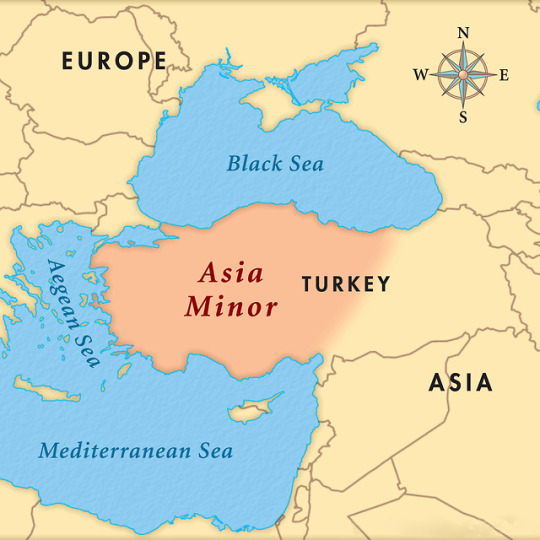
🇬🇧 Anatolia
The modern region of Anatolia in Turkey corresponds to the area described by Classical writers as Asia Minor, but in pre-Classical times it was by no means a discrete political unit, and parts of it were dominated at different times by several different civilizations, from the Hittites and Cimmerians to the kingdoms of Urartu and Phyrgia. In purely geographical terms, Anatolia is sometimes defined as a wide ‘land-bridge’ between Europe and Asia, effectively linking together the northern and southern coasts of the Mediterranean.
🇹🇷 Anadolu
Türkiye sınırları içerisinde kalan bölge. Antik yazarlar tarafından Küçük Asya olarak tanımlanan alana tekabül eder. Eski çağlarda hiçbir şekilde ayrık bir siyasi birim değildi ve çoğu zaman farklı uygarlıklar tarafından farklı zamanlarda yurt edinildi. Urartular, Frigler, Hititler, Yunanlar ve daha sonra Romalılar ve Osmanlı tarafından egemenlik altına alındı. Coğrafi olarak bir tanımlama yapılacak olur ise, Anadolu; Avrupa ile Asya arasında geniş bir “kara köprüsü” olarak tanımlanmaktadır. Akdeniz'in kuzey ve güney kıyılarını etkili bir şekilde birbirine bağlar.
#archaeologs#archaeology#archaeological#dictionary#history#ancient history#anatolia#anadou#turkey#mediterranean#arkeoloji#tarih
12 notes
·
View notes
Text
What became of the Twelve Apostles?
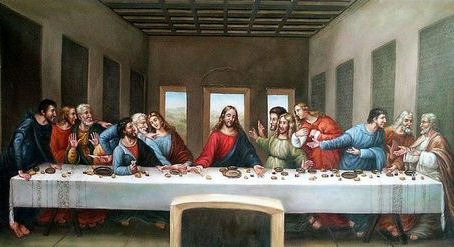
by Leonardo Da Vinci, 1498
Have you ever wondered what became of the Apostles after the first century. All the Bible tells us of them is written in the New Testament. But no New Testament writings, that were considered canonical, were written after the first century. But Christian writers of the first, second and third centuries wrote numerous books about the apostles ministry and fate. Since these works are not inspired, like the New Testament is, there is some times no way of discerning fact from myth. But below is a brief summary of what most Christian historians believe was the continuing work of the apostles until their deaths, gleaned from the aforementioned texts. Please remember that what is written is not necessarily true, but it may well be. Most of the material presented here comes from the book by William Steuwart McBirnie, "The Search for the Twelve Apostles”, Tyndale House Publishers, 1986.
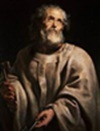
Peter, also known as Simon or Cephas was the brother of Andrew, the son of John. He began his work in Syria, where he founded the church of Antioch and was the Bishop there for seven years from 33 to 40 AD. During this time, he ministered throughout Asia Minor in the provinces of Pontus, Galatia, Bithynia, and Cappadocia. After leaving Syria, Peter went to Rome in about 44 AD and possibly stayed there until 49 AD, until being expelled along with all other Jews by Claudius Caesar. From there he went to Britain where he evangelized for some time until returning to Rome. After witnessing his own wife being put to death under the reign of Nero in 67 AD, Peter was crucified head downwards, upon his request. His apostolic symbol is a cross upside down with crossed keys, which represent his role as the Holder of the Keys to the Kingdom of Heaven. He is remembered by the Church on June 29.
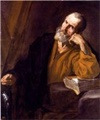
Andrew, was the brother of Simon Peter. Originally he was a disciple of John the Baptist (Mark 1:16-18). Andrew brought his brother, Peter, to Jesus (John 1:40). He evangelized mainly in Scythia, but also preached in Macedonia, Greece, and Achia. While in Patros of Achia, the Governor's wife Aepeas' was healed and converted to the Christian faith, and shortly after that the Governor's brother became a Christian. Aepeas was enraged. He arrested Andrew and condemned him to die on the cross. Andrew, feeling unworthy to be crucified on the same-shaped cross as his Master, begged that his be different. So, he was crucified on an X-shaped cross in 69 AD, which is now known as a St. Andrew's cross. His apostolic symbol is a an X shaped cross on which he was crucified. He is remembered by the Church on November 30.

James, (the elder, or James the Great), was the brother of John and the son of Zebedee and Salome (probably the sister of Mary the mother of Jesus). The New Testament tells us very little about James. His name never appears apart from that of his brother, John. They were an inseparable pair (Mark 1:19-20; Matthew 4:21; Luke 5:1-11). He was a man of courage and forgiveness, a man without jealousy, living in the shadow of John, a man of extraordinary faith. He was the first of the twelve to become a martyr. James is traditionally associated with evangelizing the country of Spain. He then returned to Judea where he ministered until his death. James' death is recorded in the book of Acts as his being beheaded under the persecution of Herod Agrippa I in 44 AD. His apostolic symbol is a scalloped shell, the sign of his pilgrimage by the sea. He is remembered by the Church on July 25.

John, the brother of James, was another son of Zebedee. John was one of the prominent Apostles. He is mentioned in many places in the New Testament. He was a man of action; he was very ambitious; and a man with an explosive temper and an intolerant heart. His second name was Boanerges, which means son of Thunder. He and his brother, James, came from a more well-to-do family than the rest of the Apostles. Since his father had hired servants in his fishing business (Mark 1:20). He labored among the churches in Asia Minor, especially at Ephesus. John mellowed with time. At the latter part of his life, he had forgotten everything, including his ambition and explosive temper, except his Lord's command of love. He was exiled under the reign of Domitian to the isle of Patmos where he wrote the book of Revelation. After Domitian's death, John was released by Nerva, the next Roman Emperor and returned to Ephesus where he died of old age in about 98 AD. It is said that an attempt was made on his life by giving him a chalice of poison from which God spared him. He is the only Apostle who died of natural causes. A chalice with a snake in it is his symbol. He is remembered by the Church on December 27.

Philip, preached primarily in Phrygia and then in Scythia. He is also associated with evangelizing the country of France. Philip was a man with a warm heart and a pessimistic head. He was one who would very much like to do something for others, but who did not see how it could be done. Yet, this simple Galilean gave all he had. In return God used him. It is said that he died by hanging. While he was dying, he requested that his body be wrapped not in linen but in papyrus for he was not worthy that even his dead body should be treated as the body of Jesus had been treated. The symbol of Philip is a basket, because of his part in feeding of the five thousand. It is he that stressed the cross as a sign of Christianity and victory. He later returned to Phrygia where he was martyred in the city of Hierapolis by being stoned and then crucified at the age of 87. His apostolic symbol is a basket and a Tau Cross, which reminds us of the miracle of the loaves and the fishes. He is remembered by the Church on May 1.
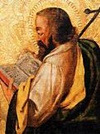
Bartholomew, also know as Nathanael, was the son of Tolmai. A number of scholars believe that he was the only disciple who came from royal blood, or noble birth. The New Testament gives us very little information about him. Tradition indicates he was a great searcher of the Scripture, a scholar in the law and the prophets and one of the Church's most adventurous missionaries. He preached the gospel in Phyrgia along with Philip and then went into Armenia after Philip's death. He also is said to have preached in Persia, Parthia, Arabia and as far as India. After preaching in India he returned to Armenia, where in the city of Albanopolis, he was flayed alive and then crucified head downward in 68 AD. His apostolic symbol is the symbol of a knife resting on the Bible recalling his life's work and his death at knife point. He is remembered by the Church on September 21.
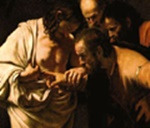
Thomas, is also called Didymus meaning "twin". Thomas was his Hebrew name and Didymus was his Greek name. Matthew, Mark and Luke tell us nothing about Thomas except his name. However, John defines him more clearly in his Gospel. Thomas appeared in the raising of Lazarus (John 11:2-16), in the Upper Room (John 14:1-6) where he wanted to know how to know the way where Jesus was going. In John 20:25, we see him saying unless he sees the nail prints in Jesus' hand and the gash of the spear in His side he will not believe. That's why Thomas became known as Doubting Thomas. He is chiefly associated with founding the church in Babylon. He also preached in Parthia, Persia, and India. He suffered martyrdom near Madras, India by being pierced through with a lance in about 60 AD. His apostolic symbol is a lance and a carpenter's square. He is remembered by the Church on December 21.

Matthew, is also known as Levi, the son of Alphaeus (or Cleophas) and Mary, and he is also the brother of James (the less). Mary was possibly the cousin of Mary the mother of Jesus. Matthew worked in and around Judea for about 15 years and then went out to minister among the Gentiles. He evangelized in the areas of Persia, Parthia, and in Ethiopia where he was beheaded in about 90 AD. There are numerous traditions of Matthew ministering to kings and other high government officials, more so than any other apostle. This was undoubtedly due to he himself being a bureaucrat, enabling him to understand how to reach such individuals. His apostolic symbol is a moneybag since he was a tax collector. He is remembered by the Church on September 21.
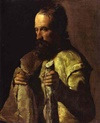
James (the less), was the brother of Matthew. Very little is known of him, in part because of the confusion between the many different James' in the New Testament. Strong tradition associates him with evangelizing Syria and Egypt where he was crucified. One interesting tradition says that James, being the cousin of Jesus, bore a remarkable resemblance to Him and this may explain the necessity of the betrayal kiss by Judas in the garden. Tradition tells us that he also died as a martyr and his body was sawed in pieces. His apostolic symbol is a saw. He is remembered by the Church on
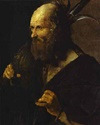
Jude, or Judas, also called Thaddaeus and Lebbaeus, was the son of James. Jerome called Jude "Trinomious" which means "a man with three names." In Mark 3:18 he is called Thaddaeus. In Matthew 10;3 he is called Lebbaeus. His surname was Thaddeus. In Luke 6:16 and Acts 1:13 he is called Judas the brother of James. Judas Thaddeus also was called Judas the Zealot. Strong tradition identifies Jude's father with James (the Elder), which would make Jude the grandson of Zebedee. Jude preached in Syria, Armenia and Persia where he was martyred by a javelin or with arrows in 50 AD. His apostolic symbol is a ship because he was a missionary thought to be a fisherman. He is known as the patron saint of hopeless cases, because his Epistle stresses that the faithful should persevere in the face of harsh difficult circumstances. He is remembered by the Church on October 28.
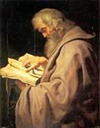
Simon, was known as the Canaanite, or the Zealot. Being a Zealot made Simon one of the fanatical Nationalists, a man devoted to the Law, a man with bitter hatred for anyone who dared to compromise with Rome. Yet, Simon clearly emerged as a man of faith. He abandoned all his hatred for the faith that he showed toward his Master and the love that he was willing to share with the rest of the disciples and especially Matthew, the Roman tax collector. Simon preached the gospel in Egypt, N.W. Africa, Mauretinia, and Britain. Joseph of Arimathea accompanied him to Britain. From Britain he returned to Palestine and ministered together with Jude in Syria, Mesopotamia and Persia, where he was martyred along with Jude, by being sawed into. His apostolic symbol is a fish, which reminds us once being a fisherman he became a fisher of men. He is remembered by the Church on October 28.

Judas Iscariot, the traitor, was the son of Simon who lived in Kerioth of Judah. He betrayed Jesus for thirty pieces of silver and afterwards hanged himself (Matthew 26:14,16). Judas, the man who became the traitor, is the supreme enigma of the New Testament because it is so hard to see how anyone who was so close to Jesus, who saw so many miracles and heard so much of the Master's teaching could ever betray him into the hands of his enemies. His name appears in three lists of the 12 Apostles (Matthew 10:4; Mark 3:19; Luke 6:19). It is said that Judas came from Judah near Jericho. He was a Judean and the rest of the disciples were Galileans. He was the treasurer of the band and among the outspoken leaders. It is said that Judas was a violent Jewish Nationalist who had followed Jesus in hope that through Him his nationalistic flame and dreams might be realized. No one can deny that Judas was a covetous man and at times he used his position as treasurer of the band to pilfer from the common purse. There is no certain reason as to why Judas betrayed his master; but it is not his betrayal that put Jesus on the cross-it was our sins. His apostolic symbol is pieces of silver, due to his betrayal of Jesus for 30 pieces of silver.

Matthias, this disciple remains a figure of mystery. Not one of the Twelve, he was later chosen to take the place of Judas. He is never mentioned again in the New Testament after he was chosen. The following is a summation of all the traditions about Matthias. As one of the earliest followers of Jesus, Matthias was prominent among the Seventy. He had apparently accompanied the Twelve Apostles on numerous occasions and very possibly may have been at first a disciple of John the Baptist. Strong tradition suggests that he ministered among the regions of Armenia. His symbol is the lance. It is an old tradition that Saint Matthias was martyred in southern Asia with such a weapon.
1 note
·
View note
Text
Character Intro: Lelantos (Kingdom of Ichor)







Nicknames- Lantos by his sister, in-laws & the rest of the pantheon
Sore Loser by Helios
Dad by Aura
My Rock by Periboia
Age- 36 (immortal)
Location- Phyrgia, Olympius
Personality- He's a brooding, misguided cunning man that is a master at ultimate stealth. He holds a deep rooted hatred towards the pantheon in general. There's only three things he cares about- his wife, his daughter & his "top secret project."
As the Titan god of air, the unseen & hunting, he has many abilities. He has the power of invisibility, aerokinesis (though not to the extent of Zeus). He's innately stronger during windy days. He's an exceptional hunter & tracker and can also innately sense, make, and disarm traps. As an offensive attack, he can manipulate the air in an opponent's body, thus suffocating them.
Lantos lives in the state of Phyrgia with his wife Periboia and their daughter Aura (goddess of the breeze) in a large cabin house, which he built himself. They also own a few dozen acres of land for his wife's farming. He mainly picked Phrygia as a home because of its natural seclusion, mountainous ranges & thick dense forests- a great draw for when he hunts. Inside his home, bronzed antlers of stags decorate a wall as trophies as well as various animal pelts.
His go-to drink is a spiced coconut chai tea. His wife makes it for him every morning. He also likes beer & a glass of pinot noir every once in a while.
Ignoring the general consensus, Lantos doesn't believe he comes from an "esteemed Titan dynasty." He's not close with his parents, Coeus (Titan god of foresight, intellect, & knowledge) and Phoebe (Titaness of prophecy, the moon, radiant intellect, & mystery)- not speaking to them in several hundred years, starting back during the Titanomachy. Because his abilities & domains were generally viewed as "insignificant towards the bigger picture", Lantos (under his parents' "advice'' was kept out of the major battles- despite having beaten Hyperion and Helios in a few duels. Because of his wife's many pleas, Lantos had sent his parents photos of Aura when she was born. As far as his relationship with his sister Leto (Titaness of demurity & motherhood) goes, he doesn't dislike her completely & will still occasionally respond to an email or phone call from her. Lantos also used to send Aura to Delos where Leto lived for the summer as a child. The visits stopped when he learned of a cruel joke Apollo and Artemis played on his daughter. He views his niece & nephew as "selfish brats'' though he hasn't vocalized this with his sister.
He doesn't have good things to say in general about the rest of the pantheon. Lantos loathes the "major god/minor god" hierarchy, viewing such things like the MGM movement and the Pantheon Walk of Fame as humorless jokes. He also hates the way Olympian history is being taught throughout schools. There's only a select few gods he considers as friends & that's Alastor (god of blood feuds & vengeance), Ioke (goddess of pursuit, tumult, & battle rout), Homadus (god of the battle-din), Anytos (Titan god of anonymity & secrets), and Ponos (god of hard labor & toil). Lantos is also friends Chiron (the immortal centaur).
When he & Periboia got married, no one was invited except for her parents- Oceanus (Titan god of the sea) and Tethys (Titaness of freshwater & clouds). Lantos loves his wife very much, often giving her massages when she's dealing with her chronic back pain.
He was the first one to teach Aura how to use a bow & arrow, dagger, and hunting knife. Lantos also taught her moves for fighting and self-defense.
Lantos does have an ulterior motive for staying in contact with his sister. He wants to gain major financial help into his secret project- a training "school" for contract assassins. He's even drawn up blueprints for how he wants it to be built.
Some of his favorite meals that he makes for himself & his family include wild turkey & dumplings, brown rice with vegetables, grilled apple cinnamon marinated venison steak, and swampfire frog legs (the recipe which he got from his mother-in-law).
In his free time when he's not having quality time with his family, Lantos prefers being outdoors- hunting, hiking, mountain climbing, kayaking or swimming in the nearby lake. He's even taken on taxidermy as a hobby. Lantos also likes poker, basketball, football (soccer), & playing billiards.
"There's two kinds of people in this world- hunters and prey."
#my oc#my oc character#my character#oc character#oc intro#character intro#oc introduction#character introduction#modern greek gods#modern greek mythology#greek myth retellings#greek gods#greek mythology#greek pantheon
2 notes
·
View notes
Video
3 May – Feast of Sts Philip and James – Apostles and Martyrs
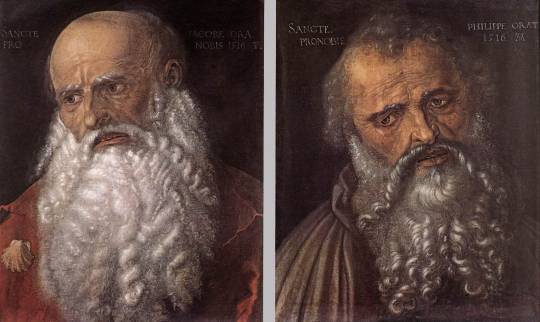
Philip was one of the first chosen Disciples of Christ. On the way from Judea to Galilee Our Lord found Philip and said, “Follow Me.” Philip straightway obeyed and then in his zeal and charity sought to win Nathaniel also, saying, “We have found Him of Whom Moses and the prophets did write, Jesus of Nazareth” and when Nathaniel in wonder asked, “Can any good come out of Nazareth?” Philip simply answered, “Come and see” and brought him to Jesus. Another characteristic saying of this apostle is preserved for us by St John. Christ in His last discourse had spoken of His Father and Philip exclaimed, in the fervour of his thirst for God, “Lord, show us the Father and it is enough.” According to the anonymous Acts of Philip, through a miraculous healing and his preaching, Philip converted the wife of the proconsul of the city of Phyrgia. This enraged the proconsul, and he had Philip, Bartholomew tortured. Philip and Bartholomew were then crucified upside down and Philip preached from his cross. As a result of Philip’s preaching the crowd released Bartholomew from his cross but Philip insisted that they not release him, and Philip died on the cross. Another account is that he was martyred by beheading in the city of Hierapolis.


St James the Less, the author of an inspired epistle, was also one of the Twelve. St Paul tells us that he was favoured by a special apparition of Christ after the Resurrection. On the dispersion of the apostles among the nations, St James was left as Bishop of Jerusalem and even the Jews held in such high veneration his purity, mortification and prayer, that they named him the Just. The earliest of Church historians has handed down many traditions of St James’s sanctity. He was always a virgin, says Hegesippus, and consecrated to God. He drank no wine, wore no sandals on his feet and but a single garment on his body. He prostrated himself so much in prayer that the skin of his knees was hardened like a camel’s hoof. The Jews, it is said, used out of respect to touch the hem of his garment. He was indeed a living proof of his own words, “The wisdom that is from above first indeed is chaste, then peaceable, modest, full of mercy and good fruits.” He sat beside St Peter and St Paul at the Council of Jerusalem and when St Paul at a later time escaped the fury of the Jews by appealing to Caesar, the people took vengeance on James and crying, “The just one hath erred,” stoned him to death.
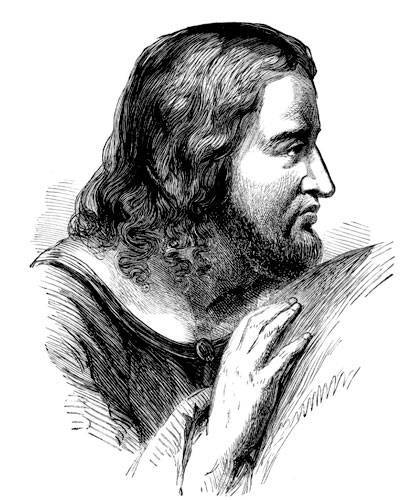

Why do we celebrate the feasts of St Philip and St James the Less on the same day? We celebrate them on the same day because their relics were brought to Rome together on the same day in early May. They rest there still, in the Basilica of the Holy Apostles. The reception of the Bodies of Sts Philip and James, which were brought from the East, somewhere about the 6th Century, gave rise to the institution of to-day’s Feast and this led gradually, to the insertion into the Calendar, of the special Feasts for the other Apostles and Evangelists. Below is the Basilica and the Crypt. The Statues are at St John Lateran.



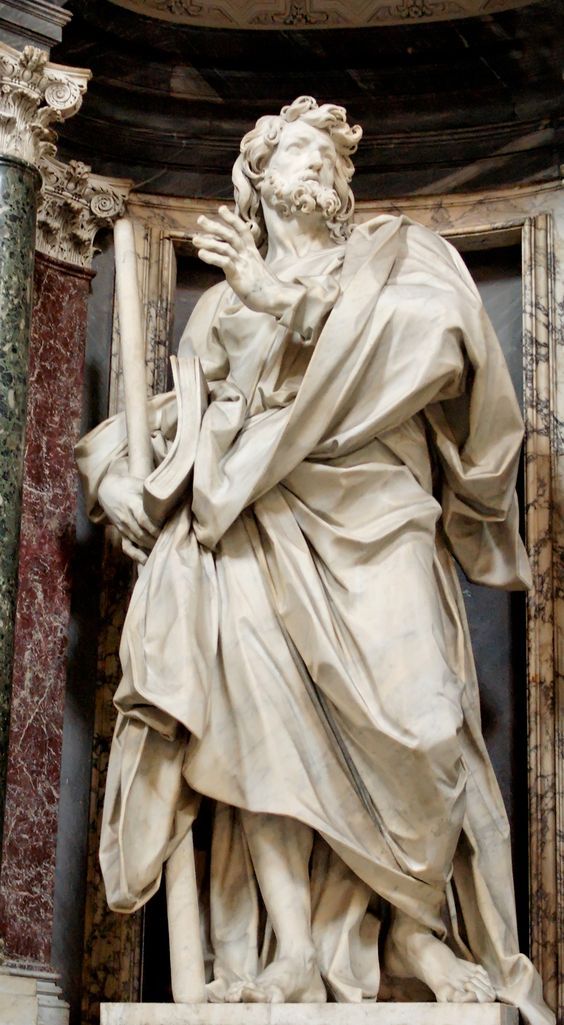
(via Memorials of the Saints - 3 May - Feast of Sts Philip and James - Apostles and Martyrs)
#stsphilipandjames#may3stsphilipandjames#stphilipapostleandmartyr#stjamesthelesserapostleandmartyr#catholic#catholicism
17 notes
·
View notes